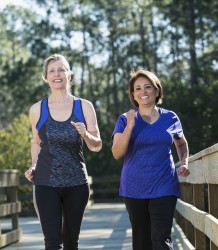Working Out to Stay Well
While most people think of exercise as a way to lose weight, there are a lot of other hidden benefits to working out. One is particularly helpful when it feels like everyone around you is getting sick – working out can help your immune system!
As soon as you begin exercising, your immune system begins to work harder. During moderate exercise, production of immune cells increases. The cells circulate more quickly through your body, which helps kill more bacteria and viruses. The increased activity of the immune system will continue for at least a few hours after a single bout of exercise. Near-daily moderate exercise appears to cause a long-term improvement in the functioning of the immune system. One study showed that subjects who completed a daily, 40-minute, moderate-intensity walk took half as many sick days due to colds or sore throats as those who did not exercise.
While this sounds like a great deal, it is possible to overdo it. Prolonged intense exercise can result in suppression of the immune system. Research shows that more than 90 minutes of high-intensity endurance exercise can cause exercisers to become susceptible to illness for up to 72 hours after the exercise session.
If you’ve already caught the office cold, this doesn’t mean it’s too late to give your immune system that boost. If you have symptoms only from the neck up and do not have a fever, then moderate exercise such as walking is safe and may be beneficial. Intense exercise should not be performed until after your symptoms have gone away. If you have flu-like symptoms, rest until your symptoms subside and avoid intense exercise for about two weeks.
However, if you are taking an antibiotic be sure to check with your doctor before exercising. Some antibiotics are known to cause tendons and ligaments to loosen. This makes exercise, especially weight lifting, more dangerous.
Make sure you’re spending some time outside as well. Colds are passed around more frequently in the winter because people spend more time indoors with others breathing stagnant air. Don’t be afraid to go out and breathe fresh air. There are many great outdoor activities to enjoy in the fall and winter. Stay active outdoors and stay well!
You may be defending yourself with exercise, but don’t forget to protect your immune system in other ways. Be sure to keep your diet healthy and well-balanced, with lots of fruits and vegetables for vitamins and minerals. Get plenty of sleep and avoid rapid weight loss. Both of these can cause suppression of the immune system.
Reynolds and Reynolds is committed to wellness as a way to help employees develop healthy habits that help them be more productive and engaged, both professionally and personally. Consult a doctor before starting any diet or fitness regimen.

















